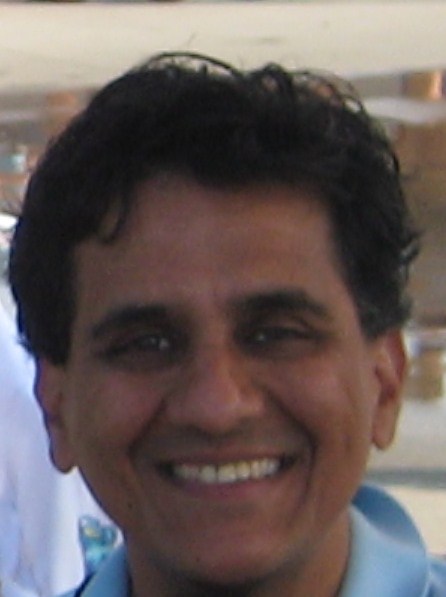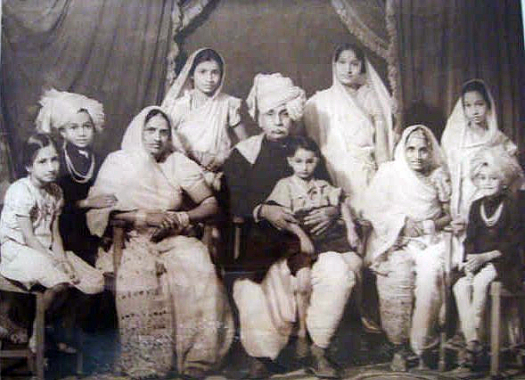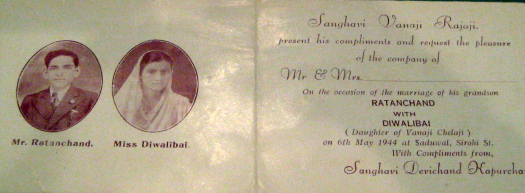Latest Contributions
Read More Contributions
Diwali and her Father by Jitendra Sanghvi
Category:

Jeet is a Registered Professional Engineer. He is the Lead Civil/Structural Engineer and Capital Budget Planner for the real estate subsidiary of a multinational automotive manufacturer, and lives in Metropolitan Detroit. Jeet is a fitness enthusiast, and enjoys reading and travelling. He is a member of the Jain Society of Greater Detroit, where he teaches Jainism basics to Middle School children at the temple on Sundays.
My mother's name is Diwali, one of India's most prominent festivals, because she was born on Diwali day. This happened in 1929 in Kolhapur (in present day Maharashtra), which was a Princely State at that time, nominally independent but in practice a part of the British Raj in India. She was the eldest surviving child of Vanaji and Santokbai Nibjiya.
I have always been amazed by my mother's perseverance. In today's culture of instant gratification, her life is an inspiration to me, and many others in her world. She has been part of and taken care of big and unique family setups, stretching the definitions of a nuclear or joint family. I have always been amazed by the stories of her childhood, especially the ones she told me, my siblings and cousins about her father and his accomplishments.
Vanaji had moved to Kolhapur from Saduwal, a small village near Sirohi (in present day Rajasthan), which was also a Princely State at that time. Vanaji was not alone in this move. Many others like him had already left or were leaving Rajasthan in search of better opportunities. Some moved to big cities such as Ahmedabad, Bombay (now Mumbai), Poona (now Pune), Bangalore, while others went to smaller cities such as Sholapur, Kolhapur, and Dhulia.
He came as a young man with his father Chelaji to set up a business. He had no formal education, but could read and write. Later, he sent all his children to the local Marathi school in the Lakshmipuri area of Kolhapur to get the education that he did not get.
Vanaji did set up a successful business dealing in precious metals and money-lending. However, he was less fortunate in his family life. He lost his first wife at a very young age after she had borne two daughters. The younger daughter died due to typhoid\; the older daughter, Rati, died in childbirth after getting married. Rati's daughter, Rukmini, was raised by Vanaji. Later, my mother would become Rukmini's step-aunt, even though Rukmini was five years older than her.
So, in the 1920s, while Vanaji did have a granddaughter (Rukmini), he had no living children. He had married a second and a third time but neither these wives nor their children survived. But, he did not give up. He was almost 40 years old when he married Santokbai, my nani (mother's mother), an only child of very poor parents in Sirohi. After several years of marriage, she too had not borne Vanaji any children. By now, Vanaji had amassed a fortune including a business in Zaveri Bazar, Bombay's famous jewellery market.
He was so anxious that he would die childless, he decided to marry a fifth time! Unknown to both Vanaji and Santokbai, she had actually conceived my mother when Vanaji married Rambhabai, who was also from a village near Sirohi.
After this, Vanaji's dearth of children turned into an abundance of children. After my mother, he had three boys and one girl with Santokbai, and another boy and two daughters with Rambhabai. Two of Rambhabai's children were born after my mother had got married.

So, Diwali grew up in a household with a biological mother and a stepmother, a step-niece who was five years older than her and five siblings before she got married to my father in 1944, barely 15 years old. Diwali loved her older niece, little brothers and sisters, and was especially close to her little sister. Her family has always been her joy, and as she grew up religion played an important role in her life.
Born in a Jain family, my mother was raised a strict vegetarian. As she grew older, under the influence of her step-mother and other women in the family, she started following the stricter Jain diet in which you cannot eat before sunrise or after sunset, you cannot eat kandmool (vegetables growing underground, such as potatoes and onions), and you have to fast once a week for 36 hours at a stretch.
Vanaji's family was getting bigger, and his 6-room home with a Ghar Mandir (home temple) and garage was getting cramped. Apart from the family, a cook, a couple of workers who came from Rajasthan, and other lady-servants, also lived in the house. Vanaji decided to add a huge (5,000 square feet) wing to the traditional Gable Roof-trussed house. This addition was a flat-roofed, three-storey structure attached to the traditional two-storey old house. The rooms in the addition were spacious, and the family lived comfortably with frequent guests and visitors coming in regularly.
When Diwali became a teenager, her parents started looking for a husband for her. Vanaji was determined to find the best boy - from within his own community - for his oldest and favourite daughter. He found his choice in Ratanchand, the English-speaking graduate of a Catholic School, who was the grandson of another Vanaji also from a village near Sirohi. More importantly, Ratanchand was the descendant of a Sanghvi- an elevated status in the Jain community.
In the Jain tradition, a Sanghvi is someone who has organised a Sangh. A Sangh is an activity such as sponsoring a new temple or organising a trip for a large group of people (including family, friends and community members) to Jain pilgrimage centres of historical significance. This event can last a few days or several weeks, depending on the money that the sponsor can afford to spend. It is believed, that this activity will improve one's status in the next life, and ultimately lead to salvation, i.e., freedom of the soul from the cycle of Life-Death-Rebirth-Life.
My great-grandfather and his two sons had sponsored a huge Sangh in 1930 in which about 4,000 people travelled in several trains from Abu Road (in Sirohi district) to Parasnath Hill (Shikharji), in present day Jharkhand, via Delhi, Varanasi, and Patna. This Sangh lasted more than two months. Vanaji, my Nanaji, had similar aspirations once he had become financially and socially successful.

Just before her wedding, Diwali’s father suffered a traumatic accident – a life changing experience. During one of his trips to Bombay, he was waiting for a train at Miraj, a railway Junction station near Kolhapur, and decided to cross over on the railway tracks. It seems – my mother has never been sure of the exact details – he did not hear the train approaching him from behind. He was able to fling his upper body beyond the tracks, but the train ran over his legs. He lost both his legs, knee downwards.
The brave and practical man that he was, in the face of such a horrendous injury, he tied up his bleeding legs with the long cloth material in his traditional Rajasthani Pheta (turban). He was taken to the HMiraj Medical HospitalH, one of India’s premier medical institutions at that time (and also at present), where he was immediately treated. He survived this accident as a double amputee, and became one of the first few people in India to be fitted with an artificial limb.
After she got married, Diwali first had to stay in Sanpur, my father’s ancestral village. However, she still spent a lot of time with her father and ailing mother for a few years after her father’s accident. Additionally, she was gradually adjusting to married life in rural Sanpur, very different from Kolhapur city, where she was born and raised.
Three years later, in 1947, Santokbai passed away. She had become asthmatic, and her health had been failing for some time. My mother lost her biological mother at the age of 18 - and acquired a new life-long role as a surrogate mother for her siblings. Of course, Diwali's stepmother Rambhabai was still alive, and she was quite loving but she had her own children to look after. My mother was close to her father and was called Akka (elder
sister in Marathi) by her father,step mother and all her siblings, and was/is looked up to for advice and counselling then and even now, as a mother normally is.
Diwali bore her first child, my oldest brother, at the age of 20 in 1949. At that time, my father's joint family in Poona was without any children. My Baasa (father's older brother, who was 18 years older than my father) had had two children, but they died young. My Bhua (father's older sister, who was 15 years older than him) became a widow during her pregnancy, lost her baby due to the stress of widowhood, never remarried(as was customary during the times), and remained childless. My Baasa and his wife - whom my siblings and I called Meetima (sweet mother) - and my widowed Bhua were very much my family as I grew up, and were part of my mother's responsibility as the years went by. In this childless family, Diwali went on to have six more children.
At the age twenty-five, before her third child was born, and on the day of her second brother's wedding, my mother lost her father. He was in his 60s, ten years had passed since his traumatic accident, and he had been in poor health for some years. Some family issues related to the wedding had been a source of tension for him. On his deathbed, he made his 21 year old son, Babu, promise that he would organize and sponsor a Sangh, which was Vanaji's unfulfilled desire. My mother and her Mamaji (stepmother's brother), who was childless himself, agreed to support my Babu mama in accomplishing this task of becoming a Sanghpati or Sanghvi.
After the death of her father, my mother was fully engrossed in her married life and taking care of her widowed mother-in-law and sister-in law along with her own children and husband. My parents had a good marriage, in which she readily played the traditional role of a woman as a homemaker. My father was a very trusting man, who ended up being cheated financially by people he trusted. My father had a nervous breakdown in his forties, when I was only five. My mother supported him through this, and the difficult time he suffered going through family inheritance disputes. He was completely out of his depression by the time I was in School and College.
My father passed away with multiple heart attacks in 1986 when he was only 59 years old. We were not aware that he had any major health issues, and he had regular habits, including long early morning walks every day. However, he did have a serious cigarette smoking addiction from his early youth days and that probably caused his sudden fatal medical deterioration. My mother was devastated but has managed to bring peace and contentment in her life since his passing. All my siblings were married by this time, and my mother was the matriarch of her own joint family from this time on.
She has visited me in the U.S. several times in the last two decades. Her first visit was unique in many ways. I had just graduated with my Master's degree and started work in the U.S. Since my wife had just started studying for her Master's degree, she was not much at home during the day. So, Diwali, who had left the comfort of her circle of friends, was forced to fend for herself in a foreign land. Using basic English, and her knowledge of several Indian languages, she made new friends with people of Indian descent in my neighbourhood from various parts of India and different age groups, and kept in touch with them after this first trip to the U.S.
A sad incident happened just a few days into her first trip to the States. My mother had lost her younger sister in India. Since they both lived in Poona after getting married, they had been close since birth and remained so till my Maasi's death. My cousins and siblings decided to keep this news from all of us till Diwali's scheduled return to India, as they felt that this news would ruin her first visit here.
Epilogue
In 2008, Diwali has 7 children, 15 grandchildren, and 11 great-grandchildren. Although, as was her own preconditioning, most of the women in her life play a traditional homemaker's role, she has adjusted to several women in her life who work outside the house. These include a daughter-in-law who is an automotive controls engineer, a granddaughter who works in the growing software industry, a granddaughter who is a teacher, a granddaughter who worked as a Human Resources Associate, and another one who is studying to be a biomedical engineer. She lives with my oldest brother and his family in India and enjoys peace and contentment in her platinum years with most of her family around her.
Next year, my mother turns eighty. It will also be the golden anniversary year of the Sangh organised on her father's behest. Her surviving brother and all other family members are planning to celebrate this anniversary by travelling together to Palitana, the destination of the original Sangh.
© Jitendra Sanghvi 2008
Comments
Add new comment